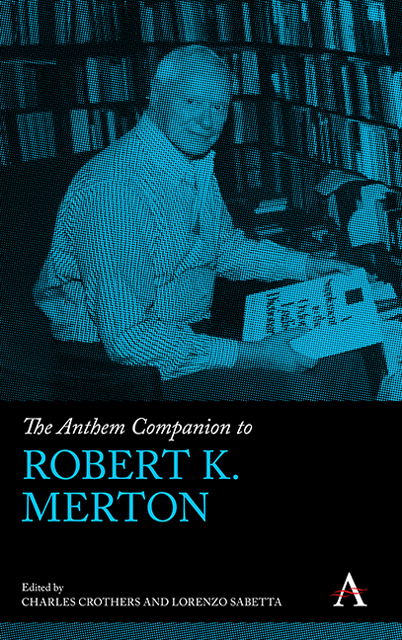Book contents
- Frontmatter
- Dedication
- Contents
- List of Figures and Tables
- Chapter One Introduction: Merton’s Self-Exemplifying Classical Sociological Contributions
- Chapter Two Skeptical Faith, Left Politics, and the Making of Young Robert K. Merton
- Chapter Three Theorist’s Progress: Young Robert K. Merton, 1941–1949
- Chapter Four Taking a Seminar with Merton
- Chapter Five The Development of Mertonian Status-and-Role Theory
- Chapter Six Theory as an Option or Theory as a Must? The Bearing of Methodological Choices on the Role of Sociological Theory
- Chapter Seven “Interviews of a Special Type”: Robert K. Merton and Codification of the Focused Interview
- Chapter Eight Science as a Culture
- Chapter Nine “Providing Puzzles”: Science as Norms and Values
- Chapter Ten A Mertonian Breviary for Cultural Sociologists
- Chapter Eleven The Unpublished Robert K Merton
- Author Biographies
- Index
Chapter Ten - A Mertonian Breviary for Cultural Sociologists
Published online by Cambridge University Press: 10 January 2023
- Frontmatter
- Dedication
- Contents
- List of Figures and Tables
- Chapter One Introduction: Merton’s Self-Exemplifying Classical Sociological Contributions
- Chapter Two Skeptical Faith, Left Politics, and the Making of Young Robert K. Merton
- Chapter Three Theorist’s Progress: Young Robert K. Merton, 1941–1949
- Chapter Four Taking a Seminar with Merton
- Chapter Five The Development of Mertonian Status-and-Role Theory
- Chapter Six Theory as an Option or Theory as a Must? The Bearing of Methodological Choices on the Role of Sociological Theory
- Chapter Seven “Interviews of a Special Type”: Robert K. Merton and Codification of the Focused Interview
- Chapter Eight Science as a Culture
- Chapter Nine “Providing Puzzles”: Science as Norms and Values
- Chapter Ten A Mertonian Breviary for Cultural Sociologists
- Chapter Eleven The Unpublished Robert K Merton
- Author Biographies
- Index
Summary
A Missing Legacy?
Robert K. Merton did not identify as a sociologist of culture and would have rejected this label as an attempt to pigeonhole his sociological style. When forced to adopt professional titles, he used to introduce himself to nonacademic audiences simply as a sociologist or, while addressing colleagues, resorting to the denominations of those American Sociological Association (ASA) and International Sociological Association (ISA) sections he belonged to: sociological theory and sociology of science. In his New York Times obituary (it is their policy to make the eulogy conform to the deceased person's thought, so that one might even take the commendation literally as a personal statement), it is handed down to posterity that Merton coined the concept of “theories of the middle range,” which refers to “undertakings that steered clear of grand speculative and abstract doctrines while also avoiding pedantic inquiries that were unlikely to yield significant results.” His contribution to the study of science is synthesized with the same brevity with which, according to Merton, scientists should provide information about themselves and their actions: “Merton gained his pioneering reputation as a sociologist of science, exploring how scientists behave and what it is that motivates, rewards, and intimidates them.”
Although RKM (Robert K. Merton loved abbreviations, even when it came to his own name) did not make “culture” the subject of his sociological research and did not consider it as the sole guiding principle of his investigations, his work nevertheless offers several insights worthy of consideration for those who have devoted themselves, in one way or another, to the sociology of culture. If some scholars in this subfield wanted to make RKM a “reference individual” (Merton 1968b, 357–359), they would easily turn to his publications that examine cultural productions empirically, but there are also other writings in which cultural characteristics are given an important place in the design of sociological research. Monographs that belong to the former category include Science, Technolog y and Society in Seventeenth Century England (Merton 1938a [1970)], Mass Persuasion (Merton 1946 [2004]), On the Shoulders of Giants (Merton 1965 [1985]), and The Travels and Adventures of Serendipity (Merton and Barber 2004), as well as countless of his essays (almost all his contributions on the different aspects of scientists’ activities, however, are collected in one volume: Merton 1979).
- Type
- Chapter
- Information
- The Anthem Companion to Robert K. Merton , pp. 183 - 200Publisher: Anthem PressPrint publication year: 2022

